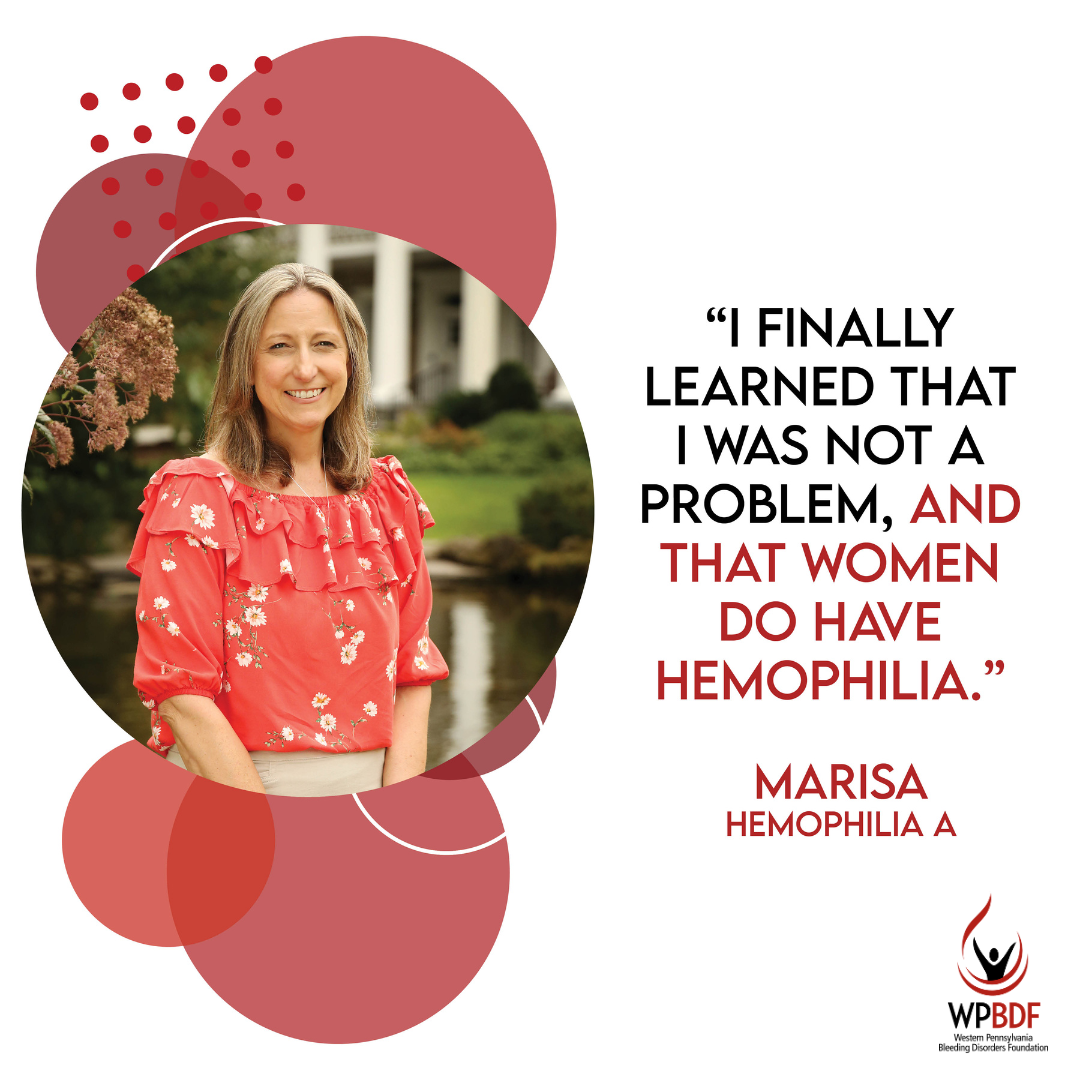Marisa has mild hemophilia A, but she didn’t receive her diagnosis until she was 31 years old. Growing up as a teenager, and throughout her early 20s, she never knew that having extremely heavy periods wasn’t normal. She bruised all the time, adding that it always looked like someone had punched her.
“Before [my diagnosis], it was terrible, especially being a woman and what happens every month. I dreaded my period. I was a two pad, super absorbent tampon kind of person because it was no joke,” Marisa said. “Every hour or two I changed them. I bled like this for almost four days and then it would slow down a bit and would last a week. I thought being a woman just sucked and we all put up with this.”
Marisa is the youngest of three girls, and their periods weren’t something they talked about with each other. Her mother passed away in 1997, so she had no one to talk to as her symptoms worsened.
“It was essentially a quarter of my month, I felt like my body was taken hostage. I had to be careful about what I wore, what I took with me… it was a lot.”
When Marisa and her husband decided to have kids, she still did not have a bleeding disorders diagnosis. She miscarried at 11 weeks in 2003 and had a dilatation and curettage (D&C) procedure done, where she continued to bleed heavily for weeks after. Marisa had another D&C a couple months later, not knowing if it was another miscarriage or remnants from her first, but she hemorrhaged again after that procedure. Finally, in 2005, her first son was born, and Marisa recalls it being an easy delivery. Yet, at 7 ½ weeks of her pregnancy, she hemorrhaged and ended up being hospitalized. Doctors still didn’t give her a diagnosis, and believed this incident was hormonal.
About a year after her son was born, Marisa began to learn a bit more about her family’s medical history. “My sister happened to be on the phone with my aunt,” she recalls, “… and she had said something about my cousin having all this bleeding. She said, ‘You know my grandfather suffered from bleeding. No idea what this means, never found out.’ My sister got off the phone and called me and said, ‘I think you have something, you need to get tested.’ A month later, I had my annual with my OB/GYN , and told him the story. He said he was happy to run some tests, but insurance might not cover them. I said that’s fine.”
A few weeks later, her OB/GYN called back, but he didn’t understand the results. He referred her to a hematologist. Marisa’s OB/GYN was trained that women can’t have hemophilia, so she had to see a hematologist to receive further testing. The first hematologist she was sent to was at State College.
“He asked me what I was doing in his office,” she said. “I told him, I just knew I got bloodwork and was sent here. I went into that appointment thinking I would finally get some answers, but that guy didn’t even look at my bloodwork or anything.”
That hematologist sent Marisa for additional blood work, and only then did he give her a proper diagnosis. “Here he was, a hematologist, and he didn’t understand the diagnosis,” Marisa said. “Because women couldn’t have hemophilia.”
She finally received her diagnosis in the summer of 2006, where she was immediately sent to the Hemophilia Treatment Center in Hershey, PA. “Here, I finally learned that I was not a problem, and that women do have hemophilia.”
Upon receiving her diagnosis, Marisa was relieved. “For years, I was made to think nothing was wrong with me and I was crazy… even though my bathroom looked like a murder scene. I felt relieved that, oh my gosh, finally I have an answer. You feel like you’re bothering people, they don’t realize that when you say you’re bleeding a lot, it’s a lot.”
Marisa quickly got her 1½ year old son tested and found out that he also had hemophilia. He showed no signs of bleeding issues before he got tested. He’d had some bloody noses, but nothing alarming.
Marisa got pregnant with her second son in 2008, and for peace of mind, she went in for an early ultrasound; however, once again at this appointment, the doctor told her, “You know, [your chart] says you have hemophilia. You know you can’t have hemophilia, right?”
“He was very condescending and a jerk,” Marisa said. Knowing more about her diagnosis, she told this doctor, “Look, I am here for an ultrasound. You can call my doctors in Hershey if you have any questions about my diagnosis.”
Marisa’s second son was tested at birth and does not have a bleeding disorder.
Now, Marisa has gone through menopause, and no longer has many bleeding issues. She sometimes needs an infusion of factor if she gets hurt or has a medical procedure. She works out every morning at her local YMCA, taking swimming classes, and enjoys hiking or bike riding with her husband and her dog on the weekends.
“It’s been a really long road, but to now be in a place where people listen to me and I am treated with respect, it’s such a relief. It’s a good feeling to know both myself and my son are being taken care of.”
Marisa sits on the Board of Directors for the Eastern Pennsylvania Bleeding Disorders Foundation. She is grateful for all the education provided by the Foundation and the multiple opportunities to connect with other women and families affected by bleeding disorders. Marisa hopes that someday, education for medical students will improve to ensure all providers have a better understanding of bleeding disorders and how they affect women.
Support WPBDF’s women, girls, and persons with the potential menstruate initiative during Bleeding Disorders Awareness Month by making a donation at: https://wpbdf.org/donations


